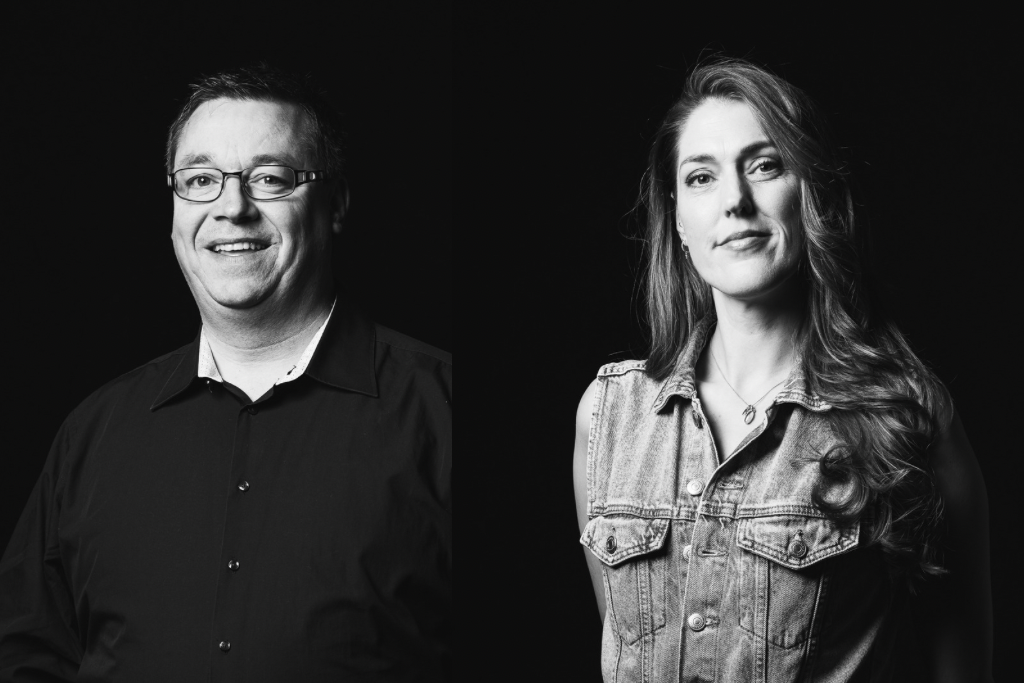Die Dreigroschenoper is one big challenge

They both love sinking their teeth into something – and they’ve done so together more than once. But how do musical director Enrico Delamboye and singer Maartje Rammeloo make The Threepenny Opera entirely their own? ‘There are hardly any conventions you have to stick to; that’s refreshing, but also challenging.’ A conversation between two partners in crime about multitasking, connection, and creating something truly unique.
Enrico, The Threepenny Opera is hard to categorise because of its mix of musical styles. How would you describe the work?
Enrico: ‘A pastiche de plaisir! It’s indeed a blend: there’s classical music, Sprechgesang, elements of show and musical theatre… I absolutely love that exchanging of styles. I enjoy bringing together a wide range of styles in one piece. The Threepenny Opera leaves a lot of room for interpretation, and there are few classical conventions to follow. That’s very refreshing. We have to figure out our own approach, and that’s different for every section. But as simple and straightforward as The Threepenny Opera may sound, it demands an enormous amount of stylistic knowledge, focus and skill – not least because I’ve got the singers right behind me in this production, instead of in front.’
Maartje: ‘Normally, the orchestra is in the pit beneath the stage, and in that setup we often have direct eye contact with the conductor. But since the orchestra and conductor are now positioned at the back of the stage, we have to follow Enrico’s beat on the monitor and try to create some kind of energetic connection… It really shows what a bizarrely multitasking profession opera is – we have to remember our lines, perform physical actions, manage costumes and props, stay vocally precise, and remain instinctively connected to everyone around us.’
Maartje, this is your first Threepenny Opera as well, how are you finding Weill?
Maartje: ‘I notice that this opera, and the role of Polly Peachum, demand much more from my head than I’m used to. I love diving completely into a role emotionally, singing and acting from my feelings. [laughs] But that’s exactly what Brecht doesn’t want; for you to feel a connection with your character! The audience isn’t supposed to feel too much either; they’re meant to think. Still, I love the challenge of making the role my own vocally, bringing together all the little technical tricks I’ve gathered over the years into one organic whole that fits the style and character of the piece.’
Enrico: ‘May I tell them what you wrote to me?’
Maartje: ‘Go on, then.’
Enrico: ‘Before rehearsals began, she sent me a little practice recording, asking: “Is this the right direction?” And I said: it’s beautiful, but sometimes still too beautiful.’
Maartje: ‘And I thought: this is completely out of my comfort zone, but I’m on the right track, rougher than I’m used to, with much more focus on the text, and less on vocal beauty!’
Enrico: ‘Classically trained singers are so used to polishing everything, to making it smooth, to feeling that emotional connection. Whereas in this opera, you’re not only playing a role, but also acting as a reflective element, showing and hearing the rawness. It’s a kind of well-coordinated roughness. I love that challenge! The more impossible something seems, the more fun it is for me. But Maartje, we can always be open and honest with each other, can’t we? So you didn’t mind me saying that?’
Maartje: ‘No, not at all! We’ve worked together for so long; I really value being able to talk about these things. I do still find it a bit daunting, though, that many audience members already have a fixed idea of how Weill should sound. So I keep asking myself: how can I win the character over, how can I make this my own?’
Enrico: ‘The Threepenny Opera sounds completely different in every production. We’re obliged – with great respect for the original – to create our own version. I don’t want a Lotte Lenya sound from you or the other singers; that wouldn’t be right.’
Maartje: ‘Luckily, I love getting my teeth into something and pushing myself to the limit!’
With what kind of mindset should the audience approach The Threepenny Opera?
Maartje: ‘As blank as possible!’
Enrico: ‘Bring your brain and your ears!’
Maartje: ‘And leave everything you know about Weill and Brecht at home.’
Enrico: ‘You’re about to see a piece about the darkness of humanity…’
Maartje: ‘Exactly. This piece should really simmer for a while afterwards. Brecht said the audience shouldn’t just feel something, they should leave the theatre changed. So the more open-minded you enter with, the more this production will be able to work it’s magic on you.’
Interview: Kyra Bertram
